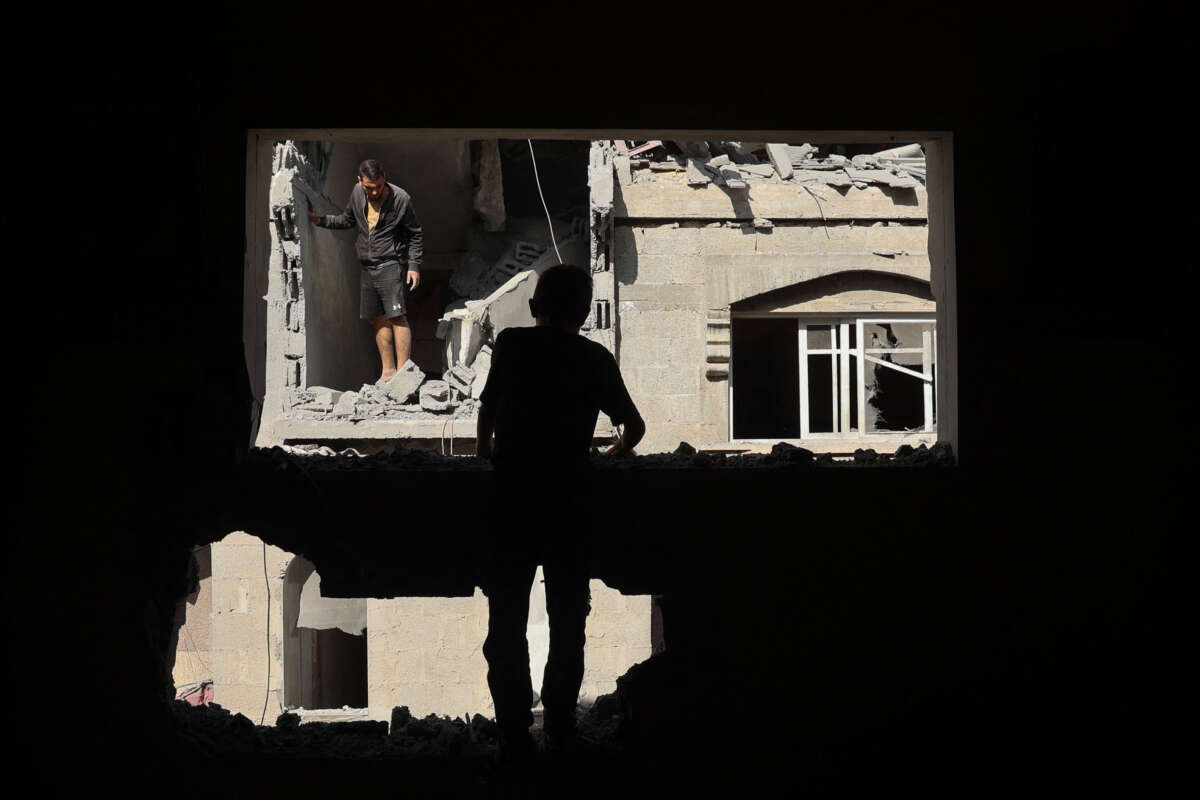Israeli forces have seized the Palestinian side of Rafah crossing, which has been the main entry point for humanitarian aid into Gaza since October, putting the entire aid operation in Gaza under threat after imposing what experts say is the worst famine in modern history on Palestinians in the region.
The little humanitarian aid that has been allowed into Gaza in recent months has largely come through the Rafah crossing on the Egyptian border, which Israel closed on Sunday. The impacts of this move have already been “catastrophic,” UN humanitarian officials have said; not only does the closure block the entry of food, it also blocks the entry of fuel, meaning trucks cannot transport aid or people, desalination plants can’t operate to provide clean water, and electricity for medical and other basic needs has been cut off.
An extended closure could mean the end of humanitarian aid operations in Gaza, Palestinians’ last lifeline.
“No aid coming in means no aid distributed after a couple of days,” said Sam Rose, director of planning for the UN Relief and Works Agency for Palestine Refugees (UNRWA), to Al Jazeera on Tuesday.
Israel also closed the Karem Abu Salem crossing, the other main humanitarian aid entry point, on Sunday. The closure of both crossings, Rose said, “cuts off everything. Rafah and Karem Abu Salem, they’re the lifeblood for the small amounts of goods that have been coming into Gaza since October. Absolutely devastating.”
Other humanitarian experts have similarly raised alarm that Israel’s invasion of Rafah will dismantle what is left of humanitarian aid infrastructure in the region — after the military already systematically destroyed the educational, food and medical systems across Gaza. “The aid system is bound to collapse, leaving those fleeing the advancing Israeli forces vulnerable to hunger and suffering,” said Jan Egeland, Secretary General of the Norwegian Refugee Council (NRC), in a statement on Monday.
The Rafah crossing seizure appears to be part of the first actions in Israel’s incursion into Rafah, which Palestinians fear and experts warn will be the most devastating phase of the genocide yet.
Videos show Israel’s intense bombing campaign, with Israeli forces carrying out what some in Rafah said was the most intense bombardment they’ve ever experienced overnight, killing at least 23 people, including five children. One clip shows an Israeli tank destroying an “I love Gaza” sign — what Palestinian journalist Akram Al-Satarri said was a show that Israeli forces are out to “destroy anything that has to do with life or love in the Gaza strip.”
Israel has spent the last months forcing 1.4 million Palestinians into the southern city of Rafah, which formerly had a population of 275,000, and is now ethnically cleansing the area by instructing them to evacuate — with all other cities and neighborhoods in Gaza damaged or destroyed and potentially housing Israel Defense Forces (IDF) snipers and unexploded ordinances.
In other words, there is nowhere left to go in Gaza. Much of the so-called humanitarian area that Israel has designated as a displacement zone has either been totally leveled by Israeli forces, as is the case of Khan Yunis, or is unlivable due to the lack of basic infrastructure, heat and disease, as with Al-Mawasi. Many families forced to flee to these areas have been displaced multiple times at this point and are weakened by months of Israel’s starvation campaign and relentless bombing.
Palestinians have already been forced to undergo the effects of Israel’s seven month-long humanitarian aid blockade. The chief of the World Food Program warned that northern parts of Gaza are in “full-blown famine” that is “moving its way south.” Israel has created endless avenues for death in Gaza: bombing, starvation, heat, disease, lack of life support. Those who have escaped death are forced to escape it time and again, every day.
The near-total blockade of humanitarian aid, which Israel appears to be carrying out now, will only intensify the famine and other deadly tactics. Dozens of people have died due to Israel’s starvation campaign; the exact number is unclear due to the dismantling of communication methods across the strip. Notably, Palestinians in northern Gaza were already restricted to a diet of 245 calories a day on average.
Recent ceasefire negotiations appear to demonstrate that no amount of diplomacy — or anything save for a blockade of foreign weapons to Israel — will convince Israeli officials to stop the Rafah incursion or the genocide. In recent days, Hamas officials have accepted multiple ceasefire agreements that would see the release of Israeli hostages — as well as the release of Palestinian prisoners who were kidnapped and held without cause by Israeli officials — in exchange for the withdrawal of Israeli troops.
But Israel has rejected agreements for hostage releases time and again, vowing that there is no agreement that could persuade Israeli officials to stop their genocidal campaign.
We have 4 days to raise $37,000 — we’re counting on your support!
For those who care about justice, liberation and even the very survival of our species, we must remember our power to take action.
We won’t pretend it’s the only thing you can or should do, but one small step is to pitch in to support Truthout — as one of the last remaining truly independent, nonprofit, reader-funded news platforms, your gift will help keep the facts flowing freely.
